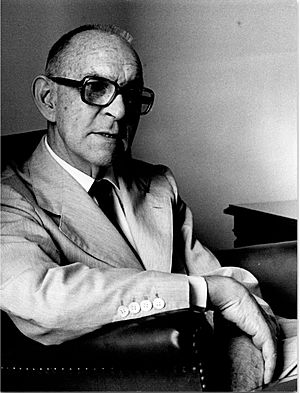Salvador Espriu facts for kids
Quick facts for kids
Salvador Espriu
|
|
|---|---|
 |
|
| Born | 10 July 1913 Santa Coloma de Farners, Catalonia, Spain |
| Died | 22 February 1985 (aged 71) Barcelona, Catalonia, Spain |
| Occupation | Playwright, poet, novelist |
| Literary movement | Noucentisme, satire |
| Notable works | Ariadna al Laberint Grotesc, Cementiri de Sinera, Una altra Fedra, si us plau |
Salvador Espriu i Castelló (born July 10, 1913 – died February 22, 1985) was a very important poet from Catalonia, Spain. He also wrote plays and novels.
Contents
Salvador Espriu's Life Story
Salvador Espriu was born in Santa Coloma de Farners, Catalonia. His father was a lawyer. Salvador grew up spending time in his hometown, Barcelona, and a coastal village called Arenys de Mar.
Early Life and Education
When he was 16, Salvador published his first book, Israel. It was written in Spanish. In 1930, he started studying law and ancient history at the University of Barcelona.
In 1933, he traveled to Egypt, Greece, and Palestine. These trips helped him learn about ancient myths. These myths later became very important in his writing.
During the Spanish Civil War
During the Spanish civil war, Salvador Espriu worked in military accounting. This was a time of great conflict in Spain.
Awards and Recognition
Salvador Espriu's work has been translated into many languages. He received several important awards, including:
- The Montaigne prize in 1971.
- The Award of Honour of Catalan Letters in 1972.
- The Ignasi Iglesias prize in 1980.
- The City of Barcelona Prize in 1982.
- The Gold Medal of the Generalitat de Catalunya in 1982.
He also received honorary doctor's degrees from the University of Toulouse and the University of Barcelona. This means universities recognized his great contributions.
His Final Years
Salvador Espriu passed away in Barcelona in 1985. He was buried in the cemetery in Arenys de Mar. This cemetery is special because it gave its name to his famous poem, Cementiri de Sinera.
Exploring Salvador Espriu's Works
Salvador Espriu wrote many different types of books. He started with novels, then wrote plays, and became very famous for his poetry.
Early Novels and Stories
In 1931, he published El doctor Rip. The next year, he released Laia. These novels were different from the popular writing styles of that time.
He also published Aspectes (1934), Ariadna al laberint grotesc (1935), and Miratge a Citera (1935). These books showed him as a very original storyteller. His writing could be funny and exaggerated, or beautiful and poetic.
Plays and Poetry
During the Civil War in 1937, he published Letizia i altres proses. In 1939, he wrote a play called Antígona. This play was about the sadness of war and showing kindness to those who lost.
His first book of poems, Cementiri de Sinera, came out in 1946. It was a sad poem written in a simple style. His play Primera història d'Esther (1948) also became very popular.
In Les cançons d'Ariadna (1949), he collected poems that mixed funny parts with sad and poetic parts. These poems also included myths, which he used in later works.
Famous Poetry Collections
Four more poetry books followed:
- Les hores and Mrs. Death (1952)
- El caminant i el mur (1954)
- Final del laberint (1955)
These books, along with Cementiri de Sinera, form a special group. They show a journey of spiritual growth. Many people have noted how musical Espriu's poetry sounds.
Popular Success and Themes
His book La pell de brau (1960) made him very well-known. In this book, he wrote about the history of Sepharad, which was his poetic name for Spain. These poems had deep spiritual, moral, and political messages.
Llibre de Sinera (1963) was another important book. It connected to his earlier works. In this book, he used the word Sinera to represent his homeland. Sinera is actually the word Arenys spelled backward!
In Setmana Santa (1971), he used images from a religious procession. He explored the idea of the Catholic Passion from a deeper, philosophical view.
Later Works and Adaptations
Salvador Espriu continued to revise his older works. He rewrote novels like El doctor Rip and Laia.
His later works included the play Una altra Fedra si us plau ... (1978), the prose book Les roques i el mar, el blau (1981), and the poems D'una vella i encerclada terra (1979) and Per a la bona gent (1984).
His works were also turned into plays by Ricard Salvat. The singer Raimon even set some of Espriu's poems to music.
A Deeper Meaning in His Work
Salvador Espriu often said his work was a "meditation on death." But his writing was much more complex than that. He explored human traditions and history in his own unique way. He often focused on Catalonia after the Spanish Civil War, talking about its struggles and hopes.
Espriu was special because he could combine big questions about human spirituality with the challenges faced by people in society. He wrote about important ideas like justice and freedom.
International Recognition
Many people around the world recognized Salvador Espriu's talent. The famous literary critic Harold Bloom once called him "an extraordinary poet."
Bloom also said that the Nobel committee made a mistake by not giving the Nobel Prize to Salvador Espriu. He believed Espriu truly deserved it.
See also
 In Spanish: Salvador Espriu para niños
In Spanish: Salvador Espriu para niños
- Catalan literature
 | Bayard Rustin |
 | Jeannette Carter |
 | Jeremiah A. Brown |

